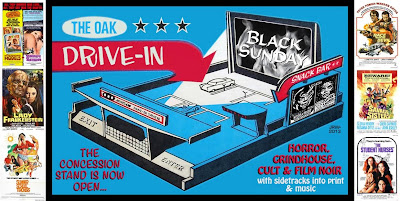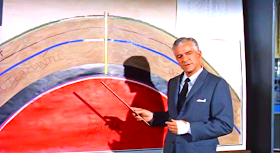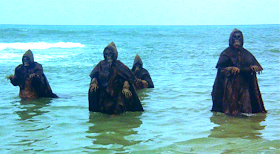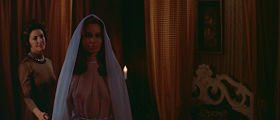With a wild mane of hair (that seemed to change color & style in every movie), a slightly cross-eyed look & a personality itself that always seemed a bit off-center, Karen Black probably could have only become a major movie actress during the counter culture Hollywood heyday of the late 60's to the mid 70's. Sandwiched between the platinum bombshell 1950's and the cover girl era that took hold in the 1980's she was the female lead of the new era of American film making.

Born Karen Blanche Ziegler on July 1 1939 in Park Ridge Ill., her first acting credit was for none other then exploitation guru Dave Friedman in 1959's The Prime Time. Cast as Betty (The Painted Woman), Friedman said later that after her agent found out about her brief nude scene he paid $2500.00 to have the negative containing the frames destroyed (Which Dave said paid for his next movie). Cutting her acting teeth in the world of 1960's NYC Off Broadway, she attended the Lee Strasberg School and made her major movie acting debut in Your a Big Boy Now from 1966. With a hint of where her career was headed it was directed by one of the future Hollywood rebels of the 1970's - Francis Ford Coppola .
Knocking around in T.V. for awhile she came to the attention of producers Bert Schneider and Bob Rafelson, who fresh off their stint as the brains behind The Monkees formed the BBS production company, a movie company with a radical attitude. She was cast in three of their movies. Easy Rider (1969), Five Easy Pieces (1970) and Jack Nicholson's directorial debut 1970's Drive, He Said. In this she plays the wife of college basketball coach Bruce Dern and has an affair with one of his players. An overlooked (although slightly flawed) 70's minor masterpiece that contains one of her best performances. The recently released Criterion BBS box set should be required viewing for anybody with even a passing interest in the history of cinema and is a perfect memorial to her.
A NY Times interviewer referred to her (with the ultimate 70's badge of honor) as "a freak, but a beautiful freak". Allowed to flourish in the perfect decade for her skills & look, she brought a wonderfully controlled realism to her performances - with something always magically off-kilter lurking around the edges. Along the way she put in two outstanding performances for Robert Altman - 1975's Nashville & Come Back To The Five and Dime Jimmy Dean from 1982. In Nashville she even got to write and sing her own songs (for which she was nominated for a Grammy).
Although cast in major Hollywood productions such as Airport 1975, The Great Gatsby and The Day of the Locust (in which she gives a wrenching performance of a black hearted wanna-be movie starlet in 1930's Hollywood) ), she always seemed more at home in smaller productions. With her performance in Alfred Hitchcock's swan song Family Plot in 1976 her major Hollywood career began winding down. The movie companies began to gravitate once again more toward the center and the freaks were pushed to the edges, plus in 1975 a temperamental giant mechanical shark would forever change the way Hollywood would market movies (and ultimately make them).
In the late 80's and 90's she seemed to find a niche in the wave of independent horror films that were flooding the market. With many of her performances regulated to 3:00 AM cable showings and direct to video stuff that filled up the shelves of rental stores, she seemed to slowly drift away to the casual movie goer. She kept on acting though - doing one woman shows, independent productions and always looking for something to challenge her.


In 1973 she starred in The Pyx, a strangle little Canadian horror/thriller that gave a hint to her future roles in offbeat low budget horror films. Karen stars as Elizabeth Lucy, a high priced call girl who in the opening scene of the film is found dead clutching an upside down cross and the title object - a pyx (in Catholicism, the pyx is a container which contains the Eucharist or communion wafer). As two detectives (Christopher Plummer & Donald Pion) investigate her death we see the past few days of her life in an unfolding flashback, which shows her slowly become immersed in a devil cult.
The film is structured rather weirdly (which may be on purpose) and you find herself thinking several times that you may have missed something in the plot. Being a Canadian project its bilingual as it incorporates French dialogue into the plot and at times almost plays like a black comedy with Plummer showing up Monty Python "The Bishop" like and finding suspects already dead before he has a chance to question them. In spite of its faults (at 108 min it drags a bit) and plus playing up the supernatural elements a little more may have helped as at times it feels more like a police procedural movie, the movie does work (strangely enough if you try not to follow the plot too closely). In addition Karen contributes and sings three plaintive/haunting folk songs to the soundtrack which helps add to the films atmosphere.
One of those films that seemed to show up on every cheapo DVD label in the world, The Pyx was finally released by Scorpion Releasing in a nice anamorphic transfer that preserves its widescreen cinematography. Karen participates in an audio commentary that initially finds her a little quiet, but she soon gets rolling and although sometimes distracted by minor details she relates some interesting facts (a double was used for her nude scenes as her hips were thought to be too fat).
At one point in 1966 she was a replacement in the folk group The New Christy Minstrels and is the only actress to have a punk/glam band named after her - The Voluptuous Horror of Karen Black.






















































